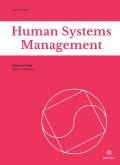Authors: Ali, Rahib | Zhang, Ziqiong | Bux Soomro, Muhammad
Article Type:
Research Article
Abstract:
Smoking prevalence is a leading health risk and preventable cause of mortality. As of 1.1 billion global smokers, 80% live in emerging countries. Predictably, 7 million of them will die annually by 2030. Mobile health (referred to as “mHealth”) gets popular in today’s healthcare management uses technology, and to combat smoking peril. Technology, being a societal human system with mutual inter-dependencies among its hardware, software, brainware and support network or net components, is integral to mHealth success. Technology espousal can empower health organizations to assimilate internal and external setups and applications, and the government in lieu of maneuvering healthcare management.
…Economic, infrastructure constraints, and high entry barriers in healthcare management has made mHealth’s triumph unclear in emerging countries. We designed a mobile application namely “Smokers’ Mirror” to examine mHealth’s leeway on tobacco control in Pakistan. Using, the technology acceptance model (TAM) pertinent in this study context. Students’ centric, time and budget constraints involved, hitherto, the study findings divulge that mHealth is expedient for smoking cessation. Moreover, Pakistani smokers agree using mHealth, believe, it is useful and easy to use. Concluding from the narrative of this study, we advocate mHealth espousal will yield promising upshots, if integrated within Pakistan’s healthcare policy.
Show more
Keywords: Smokers’ behavior, mHealth, technology, technology acceptance model, smoking cessation, healthcare
DOI: 10.3233/HSM-180380
Citation: Human Systems Management,
vol. 38, no. 3, pp. 313-327, 2019
Price: EUR 27.50





